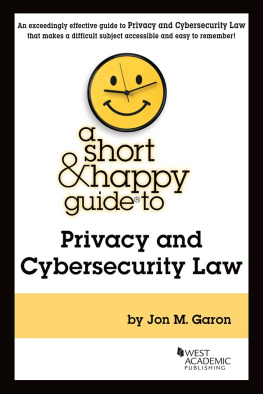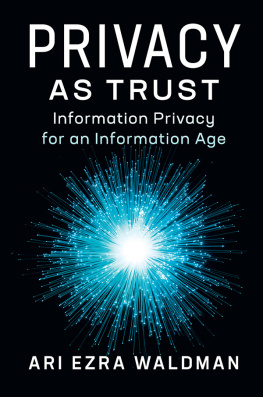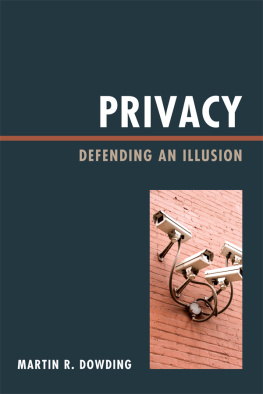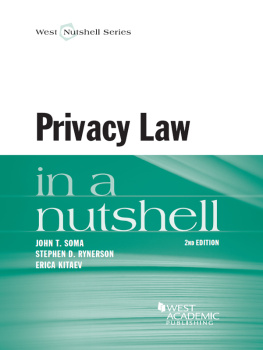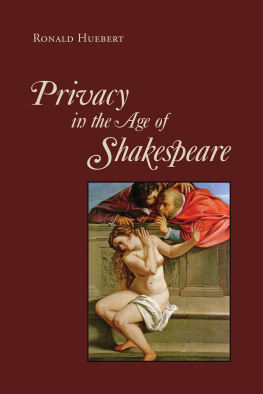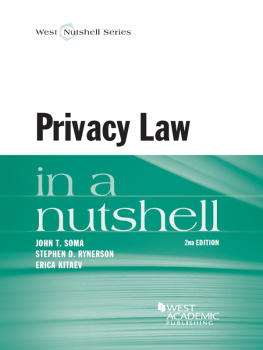Igo - The Known Citizen: A History of Privacy in Modern America
Here you can read online Igo - The Known Citizen: A History of Privacy in Modern America full text of the book (entire story) in english for free. Download pdf and epub, get meaning, cover and reviews about this ebook. publisher: Harvard Universtiy Press, genre: Politics. Description of the work, (preface) as well as reviews are available. Best literature library LitArk.com created for fans of good reading and offers a wide selection of genres:
Romance novel
Science fiction
Adventure
Detective
Science
History
Home and family
Prose
Art
Politics
Computer
Non-fiction
Religion
Business
Children
Humor
Choose a favorite category and find really read worthwhile books. Enjoy immersion in the world of imagination, feel the emotions of the characters or learn something new for yourself, make an fascinating discovery.

The Known Citizen: A History of Privacy in Modern America: summary, description and annotation
We offer to read an annotation, description, summary or preface (depends on what the author of the book "The Known Citizen: A History of Privacy in Modern America" wrote himself). If you haven't found the necessary information about the book — write in the comments, we will try to find it.
Igo: author's other books
Who wrote The Known Citizen: A History of Privacy in Modern America? Find out the surname, the name of the author of the book and a list of all author's works by series.
The Known Citizen: A History of Privacy in Modern America — read online for free the complete book (whole text) full work
Below is the text of the book, divided by pages. System saving the place of the last page read, allows you to conveniently read the book "The Known Citizen: A History of Privacy in Modern America" online for free, without having to search again every time where you left off. Put a bookmark, and you can go to the page where you finished reading at any time.
Font size:
Interval:
Bookmark:
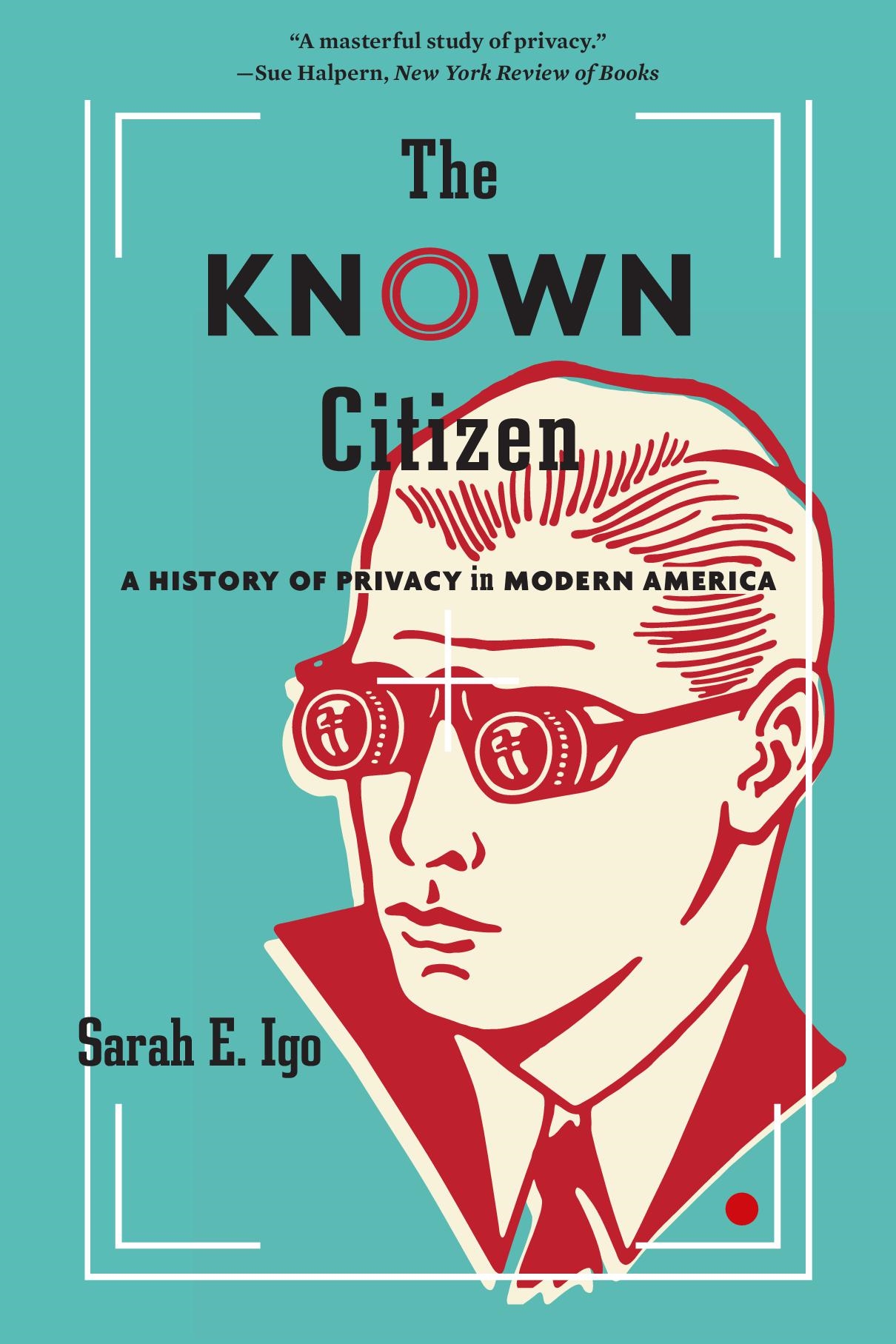
THE
KNOWN
CITIZEN

A HISTORY OF PRIVACY IN MODERN AMERICA
Sarah E. Igo


Cambridge, Massachusetts
London, England
2018
Copyright 2018 by the President and Fellows of Harvard College
ALL RIGHTS RESERVED
Jacket design: Tim Jones
Jacket image: Painting 2004 Ben McLaughlin. Courtesy of Bridgeman
978-0-674-73750-1 (alk. paper)
978-0-674-98519-3 (EPUB)
978-0-674-98520-9 (MOBI)
978-0-674-98521-6 (PDF)
The Library of Congress has cataloged the printed edition as follows:
Names: Igo, Sarah Elizabeth, 1969 author.
Title: The known citizen : a history of privacy in modern America/Sarah E. Igo.
Description: Cambridge, Massachusetts : Harvard University Press, 2018. | Includes bibliographical references and index.
Identifiers: LCCN 2017050085
Subjects: LCSH: PrivacyUnited StatesHistory20th century. | PrivacyUnited StatesHistory21st century. | Self-presentationUnited StatesHistory20th century. | Self-presentationUnited StatesHistory21st century. | Privacy, Right ofUnited StatesHistory20th century. | Privacy, Right ofUnited StatesHistory21st century. | Information societyUnited StatesHistory21st century.
Classification: LCC BF637.P74 I38 2018 | DDC 323.44/80973dc23
LC record available at https://lccn.loc.gov/2017050085
for my daughters:
Eleanor, Greta, and Harriet
and for Ole, again
beloved invaders of privacy, all
In a sardonic poem of 1940, composed just after his migration to the United States from Great Britain, W. H. Auden memorialized an Unknown Citizen. Written in the form of an epitaph for an unknown and yet all-too-knowable citizen, the poem offers a capsule biography of an unnamed individual from the point of view of the social agencies charged with tracking and ordering his affairs. The citizen it commemorates is identified by a string of code similar to a U.S. Social Security numberJS/07/M/378and his life amounts to a compendium of details gathered by employers, hospitals, schools, psychologists, market researchers, insurers, journalists, and state bureaus. The poems final lines point simultaneously to the hubris and the limits of societys knowledge of this man. Was he free? Was he happy? The question is absurd: Had anything been wrong, we should certainly have heard.
If seldom as eloquently as Auden, contemporary Americans raised similar questions about those who sought to know them, whether for the purpose of governance or profit, security or convenience, or social welfare or scholarly research. Indeed, the proper threshold for knowing a citizen in a democratic, capitalist nation would become in the twentieth century one of Americans most enduring debates. How much should a society be able to glean about the lives of its own members, and how much of oneself should one willingly reveal? What aspects of a person were worth knowingand to whomand which parts were truly ones own? Where and when could an individuals privacy be guaranteed? As the century advanced, the questions became more insistent. Were private spaces and thoughts, undiscovered by others, even possible under the conditions of modern life? What would an ever more knowing society mean for the people caught in its netand for the individual liberties that Americans supposedly prized? To wit: Could known citizens be happy? Were they, in fact, free?
This book borrows the poets questions to pry open the contentious career of privacy in the modern United States. Individual privacy first surfaced as a sustained political issue only in the late nineteenth century, but it would swiftly become a fixtureeven fixationof U.S. public culture. As corporate industry, social institutions, and the federal government swelled, so too did disputes over what sort of prying and how much probing into citizens lives were acceptable. These debates emerged alongside an increasingly impersonal, urban society: its techniques for maintaining social order but also its mass media, its scientific technologies as well as its styles of selling. Privacy talk waxed and waned, following no predictable path. But it closely tracked public attention to the perilsand the promiseof being a known citizen.
Modern privacy sensibilities were honed at the crux of a contradiction. Even as Americans grasped at wider freedoms in the twentieth century, they, like Audens protagonist, were becoming ever more intelligible to an expanding array of parties: state bureaucracies and law enforcement; the popular press and marketers; financial institutions and private corporations; scientific researchers and psychological experts; and, eventually, data aggregators and proprietary algorithms. A knowing society impinged on individual liberties in unsettling ways. Being known could bring punishment from the state or destroy a reputation crafted for peers; it could raise ones insurance rates or cost someone a job. It could even compromise ones free will and sense of authentic personhood. Because they possessed this capacity to know, modern social institutions raised Audens questions quite directly. Emerging technologies and media, novel modes of expert and corporate surveillance, and new practices of official documentation all propelled the problem of individual privacy to the foreground of U.S. public culture. There it would remain, becoming more and more central to citizens assessments of their state and social order.
Americans turned to privacy talk because it helped them navigate the pull and push of a knowing society, one that sought to apprehend, govern, and minister to its members by capturing them in fuller and finer detail. Such a society carried rewards as well as risks. The proliferation of techniques for rendering citizens knowable, from credit reports and CCTV cameras to psychological testing, promised opportunity and security, even self-understanding. But being known too wellthrough the monitoring of ones sexual or consumption habits, for instancecould threaten personal autonomy, undermining the notion of a free-standing individual so foundational to U.S. politics and culture. In like fashion, to remain unrecognizable was in certain contexts a sign of privilege, but in others a form of disempowerment. Being traceable in a national criminal or DNA database was a different matter than being identifiable to a benefits-granting program like Social Security. It was possible, that is, to suffer not only from too little but also from too much privacy. Invisibility to service providers or census takers could sharply limit ones social opportunities and legal rights. Whereas ones individual dignity might require being shielded from public view in some contexts, in others it could demand just the opposite: the validation of being named and seen. A longing for public recognition could oscillate with a desire for obscurity, even within the same person. And so, whether one could be known accurately and authenticallyand on ones own terms, rather than the larger societyswas yet another question animating privacys presence in American public life.
Font size:
Interval:
Bookmark:
Similar books «The Known Citizen: A History of Privacy in Modern America»
Look at similar books to The Known Citizen: A History of Privacy in Modern America. We have selected literature similar in name and meaning in the hope of providing readers with more options to find new, interesting, not yet read works.
Discussion, reviews of the book The Known Citizen: A History of Privacy in Modern America and just readers' own opinions. Leave your comments, write what you think about the work, its meaning or the main characters. Specify what exactly you liked and what you didn't like, and why you think so.

